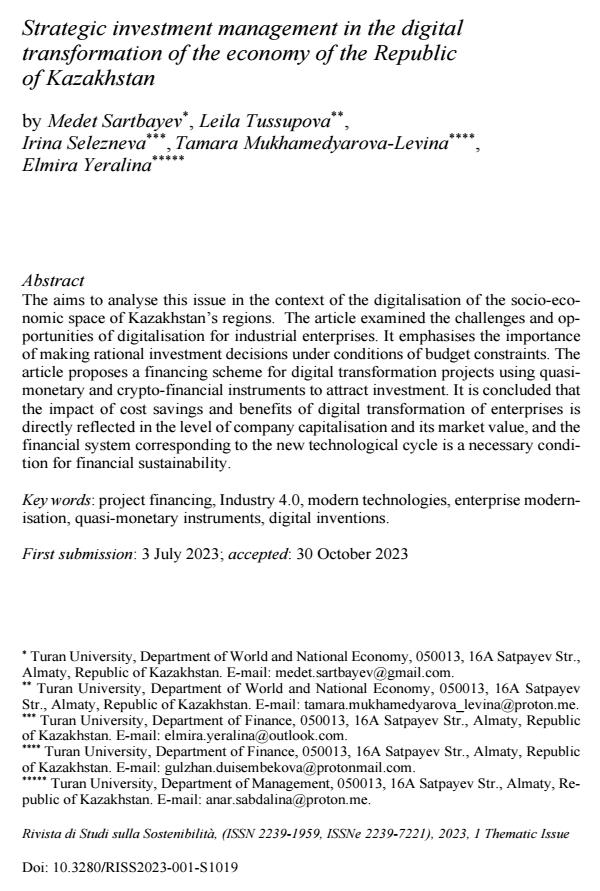Strategic investment management in the digital transformation of the economy of the Republic of Kazakhstan
Titolo Rivista RIVISTA DI STUDI SULLA SOSTENIBILITA'
Autori/Curatori Medet Sartbayev, Leila Tussupova, Irina Selezneva, Tamara Mukhamedyarova-Levina, Elmira Yeralina
Anno di pubblicazione 2023 Fascicolo 2023/1 T.
Lingua Inglese Numero pagine 17 P. 295-311 Dimensione file 144 KB
DOI 10.3280/RISS2023-001-S1019
Il DOI è il codice a barre della proprietà intellettuale: per saperne di più
clicca qui
Qui sotto puoi vedere in anteprima la prima pagina di questo articolo.
Se questo articolo ti interessa, lo puoi acquistare (e scaricare in formato pdf) seguendo le facili indicazioni per acquistare il download credit. Acquista Download Credits per scaricare questo Articolo in formato PDF

FrancoAngeli è membro della Publishers International Linking Association, Inc (PILA), associazione indipendente e non profit per facilitare (attraverso i servizi tecnologici implementati da CrossRef.org) l’accesso degli studiosi ai contenuti digitali nelle pubblicazioni professionali e scientifiche.
The aims to analyse this issue in the context of the digitalisation of the socio-eco- nomic space of Kazakhstan’s regions. The article examined the challenges and op- portunities of digitalisation for industrial enterprises. It emphasises the importance of making rational investment decisions under conditions of budget constraints. The article proposes a financing scheme for digital transformation projects using quasi- monetary and crypto-financial instruments to attract investment. It is concluded that the impact of cost savings and benefits of digital transformation of enterprises is directly reflected in the level of company capitalisation and its market value, and the financial system corresponding to the new technological cycle is a necessary condi- tion for financial sustainability.
Parole chiave:project financing, Industry 4.0, modern technologies, enterprise modern- isation, quasi-monetary instruments, digital inventions.
Medet Sartbayev, Leila Tussupova, Irina Selezneva, Tamara Mukhamedyarova-Levina, Elmira Yeralina, Strategic investment management in the digital transformation of the economy of the Republic of Kazakhstan in "RIVISTA DI STUDI SULLA SOSTENIBILITA'" 1 T./2023, pp 295-311, DOI: 10.3280/RISS2023-001-S1019